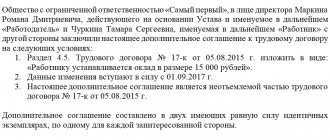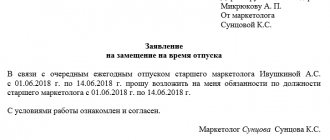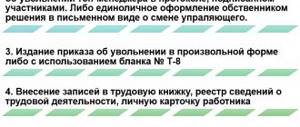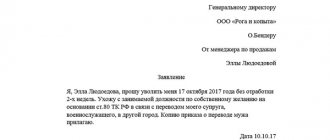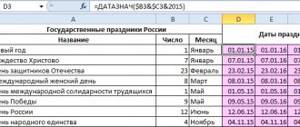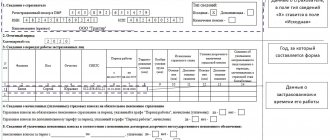The Labor Code allows the employer, under certain exceptional circumstances, to terminate the employment relationship with the employee unilaterally, that is, on his own initiative. Most of the grounds for dismissal without the consent of the employee are related to his negative behavior, incompatible with the relationship of trust within the framework of the employment contract. Along with other circumstances, the legislator provided for the commission of immoral acts by some employees as grounds for dismissal.
Who can be fired for committing an immoral act?
Important! Please keep in mind that:
- Each case is unique and individual.
- A thorough study of the issue does not always guarantee a positive outcome. It depends on many factors.
To get the most detailed advice on your issue, you just need to choose any of the options offered:
- Use the online chat in the lower corner of the screen.
- Call: Federal number: +7 (800) 511-86-74
Scope of application of clause 8 of Art. 81 of the Labor Code of the Russian Federation is outlined in the text of the paragraph of the code itself. It states that only employees of educational or educational institutions of any form of ownership can be “kicked out for immorality.” More specifics regarding the practical application of this norm can be found in the law on education in the Russian Federation 273-FZ. In Art. 23 of this normative act lists the types of institutions whose teaching staff must pay special attention to their own actions:
- preschool organizations;
- general education;
- organization of vocational training;
- Universities;
- institutions of further education.
There is a misconception that only teachers or educators can be shown the door due to loss of reputation, since they influence the fragile minds of children. This is far from true, the age of the students does not play a role, and in this sense, university teachers, psychologists, sports coaches, club leaders and master mentors are equally responsible for the moral side of their educational activities.
It is noteworthy that only those professionals whose duties are related to the educational function can fear legal prosecution for indecent acts. If there are representatives on the staff of an educational organization whose job descriptions do not contain such responsibilities, then an offense that violates public morals may result in reprimand from management, but it will not lead to dismissal.
In addition, it would be a good idea to familiarize yourself with the employment law.
Important Details
Each case requires individual consideration.
The term teaching staff includes not only employees of preschool and school institutions. Any persons who carry out educational activities fall into this category. This applies to coaches of sports sections, teachers of additional education, teachers of universities and colleges. The age of the students does not matter. Even if these are adults, the teacher’s task is to preserve their moral character . Another important feature of the application of the article is that it applies only to those employees whose job description specifies an educational function. Some educational institutions hire separate employees for this. Accordingly, if a person does not have such responsibilities, then he cannot be fired for immoral behavior. But he may get a reprimand from his superiors.
It does not matter where and when the act is committed: during working or non-working hours, within the walls of an educational institution or outside it. All this only affects the subtleties of doing business.
What act and behavior is considered “immoral”?
If with a circle of persons falling under clause 8 of Art. 81 of the Labor Code of the Russian Federation, while it is quite easy to decide, it is almost impossible to compile an exclusive list of indecent acts. Some immoral acts are classified as criminal or administrative offenses. If an education worker committed any of them, then its essence and circumstances will be reflected in the protocol or court verdict. To these are added everyday situations or behavior in the workplace:
- gross violation of the rules of behavior in society (drunkenness, indecent acts, public manifestations of a severe form of addiction, etc.);
- the use of unjustified physical violence or mental pressure on those being educated;
- involving students in questionable activities;
- other criminal or administrative actions against students or in their presence.
But even in this case, you cannot blindly follow the document you receive and hope that it will protect you from proceedings in the circumstances of a labor dispute. The Labor Code allows dismissal only when the teacher’s action cannot be compatible with the continuation of his educational work. In other words, dismissal for committing an immoral offense is unacceptable if a person violated the rules of crossing the street, exceeded the speed limit, or disturbed the silence at night.
But the behavior of a teacher associated with the use of force against his students, offensive statements, defiant behavior, which set a negative example for those being taught, may well be the subject of consideration by a commission on moral and ethical issues. Less significant misconduct may also be a reason to doubt the suitability of an educator if it is expected to occur continuously and lack a desire to correct the situation.
Dismissal for immoral actions is possible only in cases where this is incompatible with educational work, clause 8 of Art. 81 Labor Code of the Russian Federation.
Registration procedure
Because the interpretation of the concept of “immoral” is subjective, management is not recommended to make a decision without authorization.
First you need to give the procedure legality. If the offense falls under the jurisdiction of the police, then they themselves draw up the relevant documents. Otherwise, everything falls on the shoulders of management. The main materials can be:
- video recording of the offense;
- reports from colleagues or parents;
- complaints from students or their legal representatives.
In some cases, an employer-initiated investigation may be possible. It is carried out even in the absence of written requests. It is enough for the director to know about what happened.
Thanks to the Internet, videos with obscene behavior end up on social networks. When viewing them, you can identify the main characters.
It is important to correctly document the fact of committing an offense. For this purpose, an act is drawn up, to which all the collected evidence is attached. It would be useful to obtain confessions from eyewitnesses (they should not be from the team of pedagogical workers of the institution) - they should be in writing. All videos and audio recordings are copied. All materials are needed in order to determine the true motives of an action.
Features and procedure for dismissal
Since the concept of morality can be interpreted differently even within a small group of equally educated people, management should not arbitrarily decide the career fate of any employee. That is why dismissal for immoral behavior of a teacher or educator will require additional measures to give the procedure legitimacy. Most often, such conclusions must be confirmed by the collegial opinion of the same teachers.
Witnessing the fact of misconduct
If the incident does not fall under the jurisdiction of the police, then the responsibility for recording and collecting evidence will fall on the management of the establishment. In a modern educational institution, obtaining materials and grounds to begin an investigation is not difficult:
- report from a colleague or immediate supervisor;
- complaint from an interested party (parents, guardians, students themselves);
- CCTV data;
- a video shot on the mobile device of one of the participants or witnesses of the events.
Moreover, even if there is no written appeal, but the director has become aware of what happened for certain, an investigation can be started on the initiative of the director. Even materials that initially appeared on the Internet can become an impetus, if they allow us to identify all participants or at least confirm the identity of the teacher.
Registration of the fact of committing an immoral offense
As soon as the signal about the emergency has reached the authorities, it is necessary to secure all the details in the form of an act, attaching to it reports, explanatory and written testimony from eyewitnesses not from the team. For a detailed and objective consideration of the circumstances, it is also necessary to seize or copy video and audio files if they can help establish the true motives and degree of guilt of the employee.
Creation of a commission to investigate the commission of an immoral offense
Conclusions about the immorality of the behavior of one of the employees, made solely by one of the authorized officials, will immediately raise doubts about their objectivity. To avoid distortion of facts, specialized commissions are created in educational institutions to assess the severity of the offense and the extent of its impact on further educational work.
The composition of the commission must be approved by order. Moreover, it should include only those who cannot be accused of systematic violations in the field of ethics. The principles for forming a commission by name depend on what is written in the internal local act (appointment of members by decision of the manager or elections within the team). In particularly difficult cases, it is permissible to involve third parties in the commission as experts (psychologists, lawyers, technical specialists, etc.).
The circumstances of the act and its consequences are considered collectively.
Registration of the decision of the commission to investigate the commission of an immoral offense
The main task of the commission is not to consider the evidence and establish the fact of violation of discipline and morality. The primary task of the board is to justify the answer to the employer’s doubts about whether it is possible to fire a teacher for immoral behavior in a specific situation.
How the meetings of this “judicial” body will be held is not specified in the legislation. But it seems logical that based on the results of the meeting, a report on the review will be drawn up, and all supporting documents will be attached to it. An obligatory part of the act or minutes of the commission meeting should be an unambiguous conclusion about the possibility of further work with students.
Obtaining an explanation from an employee who has committed an immoral offense
Making an objective decision is impossible without taking into account the opinions and circumstances of the other party. If everything happened on the territory of the educational organization, the director must necessarily consider the employee’s explanations, Art. 193 TK. From this it logically follows that it is enough to offer to write an explanatory note in writing, present it to the offender against signature, and then wait at least two days until the results of the internal inspection are approved.
If after a couple of days an explanation is not provided, the employer has every reason to make any decisions without taking into account the details known to the dismissed employee.
Committing indecent acts outside of work or at home is exempt from the obligation to wait for an explanation. However, judicial practice suggests that it must be required in any case, so that the results of consideration by the labor dispute commission or in court do not come as a surprise to the employer.
We fight “evil tongues” in the team using legal methods
The plaintiff appealed to the court with a demand to recognize the order to impose disciplinary liability issued by the employer, the Ministry of Internal Affairs, as unfounded and illegal.
This order reprimanded her with the wording “for violating the requirements of Art. 2 of the Code of Professional Ethics for Employees of the Internal Affairs Bodies of the Russian Federation, approved by Order of the Ministry of Internal Affairs of Russia dated December 24, 2008 No. 1138, regarding non-compliance with the principles, norms and rules of conduct established by the Code, which is the moral duty of every employee of the internal affairs bodies, regardless of their position; violation of the requirements of paragraph.
4 tbsp. 15 of the said Code, causing harm to the moral and psychological climate in the team, including: discussion of orders, decisions and actions of senior superiors, implemented within the limits of their authority; spreading rumors, gossip and other unverified information of a dubious nature and misleading the leadership of the Ministry of Internal Affairs for the Karachay-Cherkess Republic.”
Terms of dismissal
The right to exclude a teacher with a “tarnished” reputation from the teaching staff does not depend on the place on the map. The only difference is to determine the procedure and timing of dismissal:
| Scene of the incident | Procedure | Timing of dismissal |
| The offense occurred during working hours within the educational institution or in front of students. | In order to impose a disciplinary sanction, Art. 193 Labor Code of the Russian Federation. | Within a month from the date of discovery, but no later than 6 months after its occurrence. |
| It all happened after work or at home. | Adhere to Art. 193 of the Labor Code of the Russian Federation there is no reason, since dismissal will not be qualified as a disciplinary punishment, but will become a termination of the contract on certain grounds. | The settlement at the initiative of the directorate should be implemented no later than a year from the date of discovery of the offense or the provision of reliable information about its commission, paragraph 47 of the Resolution of the Plenum of the Armed Forces of the Russian Federation No. 2. |
| The offense occurred during working hours either within or outside the educational institution, but this did not interfere with the performance of educational functions. | If there are signs of a disciplinary violation, the appropriate punishment can be applied to the employee, Art. 193 Labor Code of the Russian Federation. | Grounds for dismissal in accordance with clause 8 of Art. 81 of the Labor Code of the Russian Federation no longer exists. Termination of the employment relationship is only possible if the employee already has outstanding penalties. |
Removal from work of a teacher who has committed an immoral offense is possible only if a criminal offense is committed, Art. 76 Labor Code of the Russian Federation.
Selected grounds for dismissal of teachers
However, the court, when considering the case, found that during the conflict, teachers repeatedly committed verbal insults during breaks, which at times escalated into brawls.
All this happened in front of the students, therefore, immoral acts were committed. Therefore, the demands were refused (Appeal ruling of the Moscow Regional Court dated 04/03/2012 in case No. 33-6057/2012).
Let us note that forcing students to lie can also be regarded as an immoral offense and in such a situation the dismissal of an employee of an educational organization performing educational functions will be legal (Appeal ruling of the Moscow City Court dated June 20, 2014 in case No. 33-22169). Thus, any violation of moral principles and socially accepted norms of behavior can be considered an immoral offense. But in addition to determining the immorality of the act committed, the employer should clearly understand that not every employee can be fired for it.
Thus, the Plenum of the Armed Forces of the Russian Federation in Resolution No. 2 of March 17, 2004
“On the application by the courts of the Russian Federation of the Labor Code of the Russian Federation”
pointed out that for committing an immoral act, only those workers who are engaged in educational activities can be fired, for example, teachers, teachers of educational institutions, vocational training supervisors, teachers of child care institutions, and regardless of where the immoral offense was committed - at the place of work or at home ( paragraph 46). Of course, the educational function, in addition to teachers and teachers, is also carried out by coaches of sports sections, heads of creative circles, sections and studios, as well as employees who are engaged in educational work in addition to their official duties, for example, deputies for educational work.
Thus, the Altai Regional Court refused to reinstate the director of the MCOU secondary school. The director believed that he did not belong to employees performing educational functions, since he exercised leadership and did not teach lessons.
What payments are due?
The degree of unethicality of the offense or the personal opinion of management regarding the guilty person cannot change the list of guaranteed payments upon dismissal. The Labor Code of the Russian Federation includes:
- salary;
- compensation for unpaid paid leave (both regular and additional);
- the amount of all agreed and undisputed debts existing on the settlement day;
- other payments specified in the collective agreement or individual contract, if they are appropriate in this particular case.
It should be noted that the norms of internal regulations (regulations, orders, collective agreements, etc.) in judicial practice are interpreted in favor of the employee. This means that if they do not directly prohibit the payment of severance pay to someone who leaves due to discreditable circumstances, the money must be issued in the prescribed amount on the day the order is read.
Payments upon termination of an employment contract for immoral behavior
The final settlement with the dismissed person is a mandatory stage of termination of the employment relationship. A huge number of disputes are initiated by former employees due to incomplete or late payment.
Attention
In the event of dismissal due to an employee’s guilty behavior, as well as for any other reasons, no delays in the issuance of due funds are allowed.
Payment is made on the last day of work. If the employee is absent on this day, money is paid the next day after receiving a request for payment from him.
Upon dismissal for immorality, an employee is entitled to the following payments:
- earnings for the period worked before dismissal;
- compensation for the remainder of the vacation period.
The employee cannot count on severance pay or compensation.
Is there a workaround?
In the Labor Code there is no concept of working off at all, there is only a mention of the period for warning the employer about leaving. It is too optimistic to assume that management will retain an employee who has compromised himself in the eyes of colleagues and students.
It’s another matter if the parties have agreed on non-disclosure of the circumstances of the investigation, and the employee writes an application for voluntary settlement. But even in this case, it would not even occur to the director to detain a teacher in relation to whom there is evidence of vicious behavior.
Sample complaint about rudeness of an employee
Code of Administrative Offences, a publicly expressed humiliation of honor and dignity is considered an insult.
I ask you to take disciplinary measures against Sidorov P.
M. May 16, 2021 signature, Ivanova M.
I. memo against an employee for insulting Below is a photo of the document for visual reference: You need to write clearly and to the point what exactly happened. The main thing to remember is that such a document should never be written in a hot head.
You need to calm down. Under no circumstances should you get into an argument with the offender - this will make you guilty of unacceptable behavior. The head of the organization will be informed about your violation, after which you may receive a penalty, or even lose your job.
We recommend reading: Vehicle traffic prohibited comments on the sign
Therefore, if the case is ambiguous, dial the free legal advice number and ask what you can do.
Entry in the work book
The work book must be issued to the employee on the day of actual payment or, with written consent, it must be sent to him by mail. On the pages of the document there must be a record of the reason for dismissal, an indication of clause 8 of Art. 81 Labor Code, as well as a link to the order for the enterprise.
If the parties nevertheless managed to reach an agreement on leaving without scandal and publicity, then clause 1 of Art. 77 of the Labor Code of the Russian Federation (consent of the parties).
Dismissal for an immoral act, like any type of settlement initiated by the employer, requires proof of guilt. The law places this responsibility on management, based on the presumption of innocence in relation to the employee, until there are arguments in favor of the contrary. Therefore, the director of an educational institution needs to be especially careful not only in collecting supporting materials, but also in justifying the detrimental impact of what happened on the education of students.
Zinovieva Natalya Igorevna
Lawyer at the Legal Defense Board. Specializes in handling cases related to labor disputes. Defense in court, preparation of claims and other regulatory documents to regulatory authorities.
When an employer is ashamed of his employee
168 lawyers are now on the site A written complaint was received from a parent about the immoral behavior of a teacher (the teacher is dating the student’s father).
The order was issued in violation of the requirements of the T-8 form; it does not indicate in relation to whom the violation was specifically committed and whose complaint was investigated. According to Art. 84.1 of the Labor Code of the Russian Federation, on the day of termination of the employment contract, the employer is obliged to issue the employee a work book and make payments to him in accordance with Art. 140 Labor Code of the Russian Federation.
These provisions of labor legislation were also violated. Taking into account all the circumstances of the case, the court satisfied O’s claims. * * * In conclusion, let us once again draw attention to the fact that educational activities require from the workers carrying out them not only high qualifications, but also appropriate moral character and behavior, both in the team and in everyday life Violation of moral standards is incompatible with the performance of the functions assigned to such employees.
How else can you fire a teacher? In addition to the general grounds for dismissal under clause 8, part 1, art. 81, Labor Code, namely Art. 336, there are special grounds for dismissal that apply only to teaching staff.
Let's look at some of them. One of these grounds is repeated gross violation of the charter of an educational institution within one year (clause 1 of Article 336 of the Labor Code of the Russian Federation). This basis can be applied if the organization’s charter provides for a list of such violations.
If it is not in the charter, a gross violation can be considered the improper performance by a teacher of his job duties or standards of professional ethics, if they are enshrined in the provisions of a local regulatory act, for example, internal labor regulations, job descriptions (if the charter enshrines the obligation to comply with the requirements of the relevant local acts).
O. was forced to make a remark, when there was no reaction, she approached student N. and demanded to stop the disgraceful behavior, to which he grinned and answered her rudely. Then O. took him by the shoulder to stop him, but N.
raised his hand as if he intended to hit her, and O., in self-defense, accidentally hit N. in the face with her hand. This ended the conflict, O. continued the lesson. Upon learning of the situation, the school director issued an order to temporarily suspend O.
from work and on April 20, 2009, without notifying or inviting her, he held a meeting among students to discuss this incident. 04/21/2009 O. was asked to write an explanatory note. On April 22, 2009, an order was issued to dismiss O.
We invite you to read: How to conclude a fixed-term employment contract with an employee


